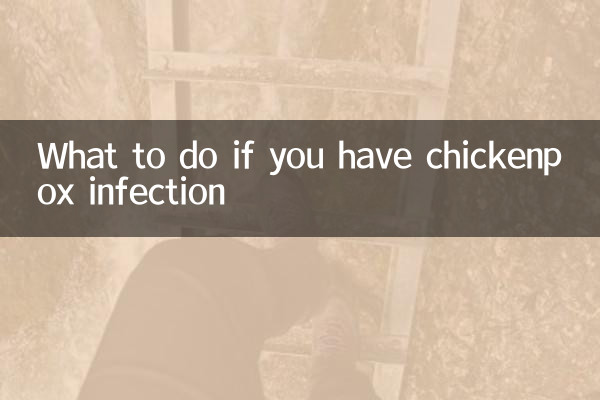What to do if you have chickenpox infection
Recently, chickenpox infection cases have been on the rise in many places, especially among children and adolescents. Chickenpox is an infectious disease caused by the varicella-zoster virus and is highly contagious. This article will provide you with a comprehensive guide to chickenpox infection, including symptoms, treatments, and prevention.
1. Symptoms of chickenpox

Typical symptoms of chickenpox include:
| Symptoms | Description |
|---|---|
| Fever | Usually starts 1-2 days before the rash appears |
| rash | Red macules develop into blisters and eventually scabs |
| itching | Severe itching is often experienced at the site of the blister |
| Weakness | accompanied by general malaise and loss of appetite |
2. Treatment of chickenpox
If you get chickenpox, you can take the following steps:
| Treatment | Description |
|---|---|
| antipyretics | Use acetaminophen to reduce fever, avoid aspirin |
| Anti-itching measures | Use calamine lotion or antihistamines to relieve itching |
| antiviral drugs | Severe cases may require antiviral drugs such as acyclovir |
| keep clean | Take daily warm baths and avoid scratching blisters |
3. Preventive measures against chickenpox
The most effective way to prevent chickenpox is vaccination:
| Precautions | Detailed description |
|---|---|
| Vaccination | It is recommended that the first dose be given at 12-15 months and the second dose at 4-6 years old |
| avoid contact | Stay away from people with chickenpox, especially those who have not been vaccinated |
| personal hygiene | Wash your hands frequently and keep the environment well ventilated |
| Isolate patient | Infected people should be quarantined at home until all blisters have scabbed |
4. Complications of chickenpox
Although chickenpox is usually a self-limiting disease, the following complications may occur:
| Complications | Risk groups |
|---|---|
| skin infection | Bacterial infections caused by scratching |
| pneumonia | Adults, immunocompromised persons |
| Encephalitis | Rare but serious complications |
| Reye syndrome | Children using aspirin |
5. Care points for chickenpox patients
When caring for someone with chickenpox, be aware of:
1.Keep patients comfortable: Wear loose cotton clothing and keep the room temperature appropriate
2.diet conditioning: Provide easily digestible food and add more water
3.psychological care: Child patients may be irritable due to discomfort and need to be patiently comforted.
4.Monitor symptoms: Pay attention to observe whether there are signs of complications, such as persistent high fever, difficulty breathing, etc.
6. The relationship between chickenpox and shingles
After recovery from chickenpox, the virus may lie dormant in the ganglia and may cause shingles years later. Therefore, preventing chickenpox can also reduce the risk of shingles in the future.
Currently, there are corresponding vaccines available for the varicella-zoster virus, and it is recommended that high-risk groups consult a doctor for vaccination.
7. When Do You Need Medical Treatment?
You should seek medical attention immediately if:
| situation | Description |
|---|---|
| High fever that persists | Body temperature continues to exceed 39°C |
| rash infection | Purulence, swelling, and increased pain occur |
| difficulty breathing | Possible symptoms of chickenpox pneumonia |
| altered consciousness | Drowsiness, irritability, or twitching |
Although chickenpox is common, timely care and treatment can effectively relieve symptoms and prevent complications. Through vaccination and good hygiene, we can greatly reduce the risk of infection. If suspicious symptoms occur, please seek medical treatment promptly and follow the doctor's instructions.

check the details

check the details